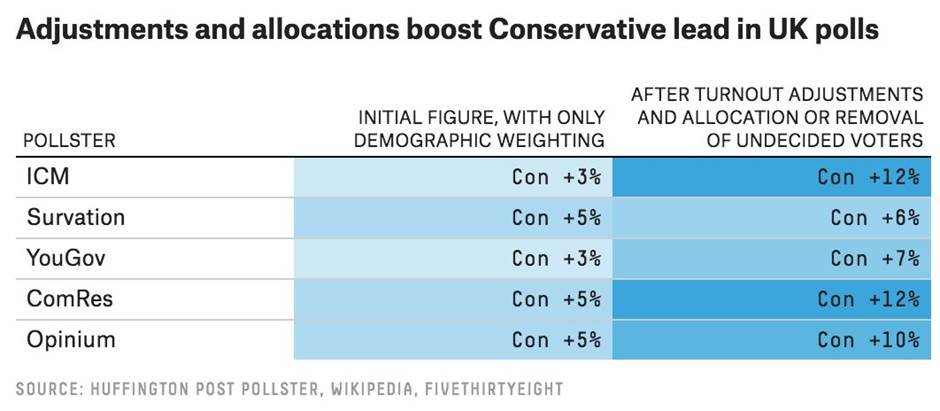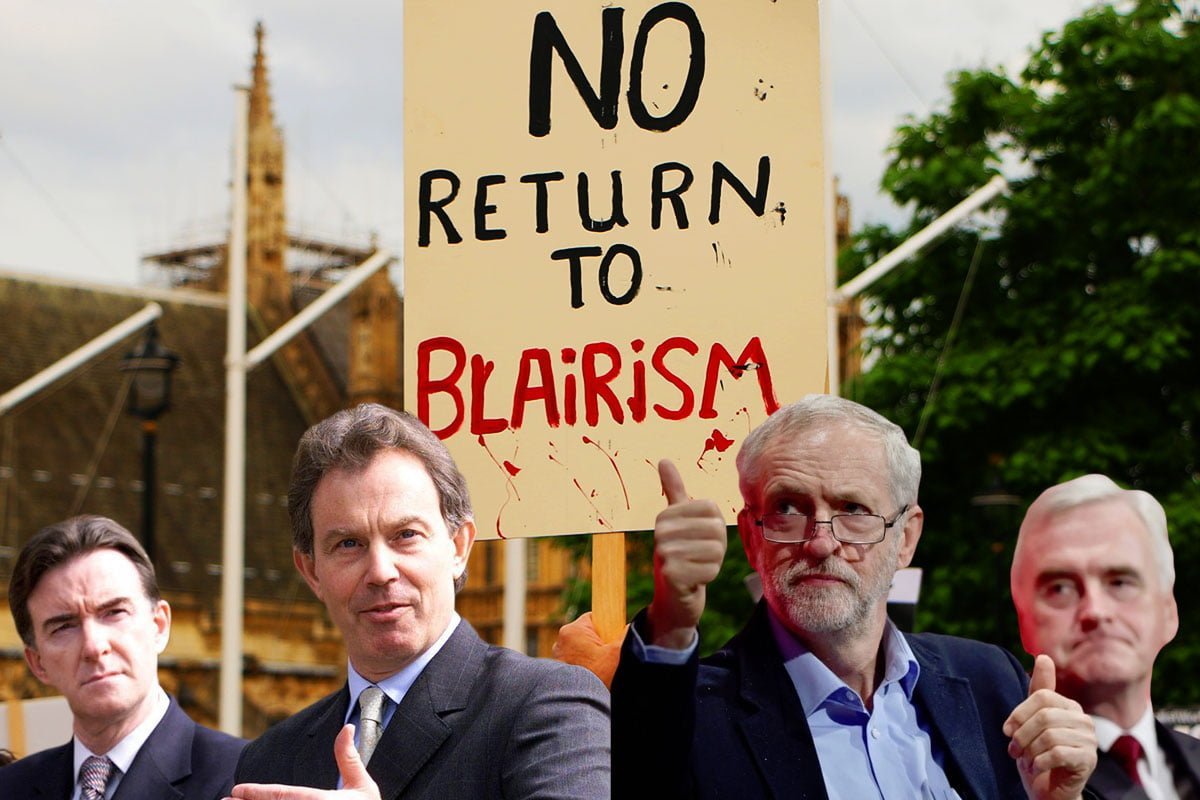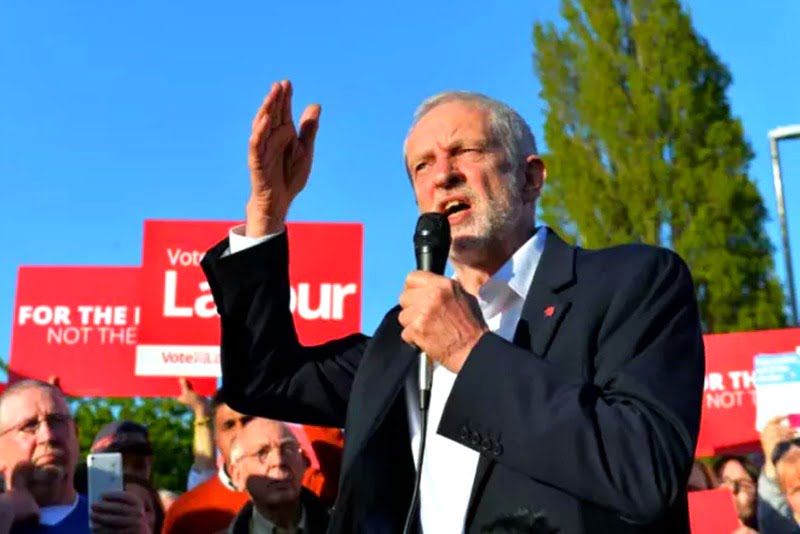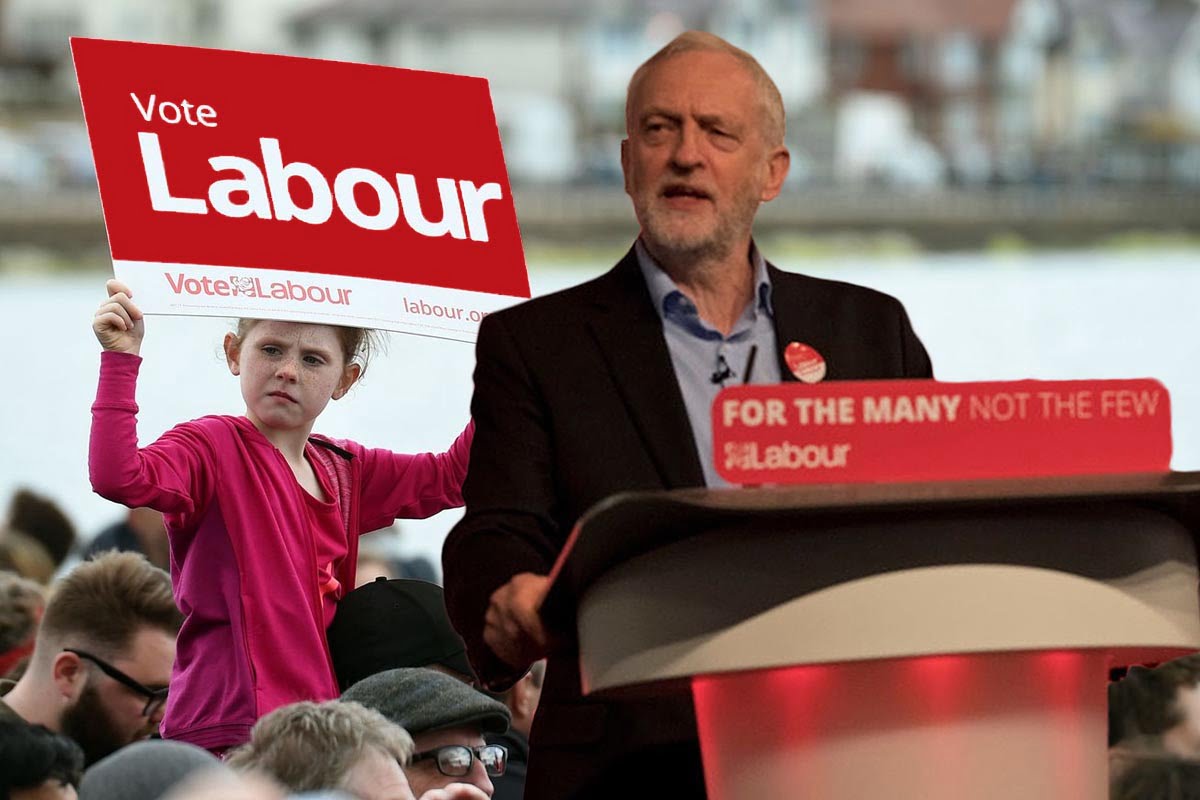Corbyn’s election campaign has continued to gather momentum, becoming a mass movement of workers and youth. With less than a week until election day, the vulnerability of May and the Tories is now clear for all to see. Latest studies reveal the possibility of a hung parliament. Time to go on the attack!
Only a few hours notice was needed for thousands to come out to greet Jeremy Corbyn as he arrived to participate in the leaders’ debate on BBC1 in Cambridge (sans Prime Minister, Theresa May). The scene was reminiscent of a rock star touching down or a revolutionary hero arriving after years of exile. Thousands of people propelled Corbyn into the debating chamber with chants of ‘Cor-byn! Cor-byn! Cor-byn!’.
(Compare that to the audible boos for Tory stand-in Amber Rudd when she arrived.)
The crowd stayed outside the building for the duration of the debate, trying to shout loud enough that the participants could hear them, willing Corbyn forwards and intimidating Amber Rudd, the Tory substitute.
Another video has appeared online of an impromptu round of Corbyn chanting at a school prom in Lewisham, South East London, after the ‘prom king’ used his coronation speech to say “If you don’t vote Corbyn, I don’t know what you’re doing!” Seemingly the entire school year has been swept up in enthusiastic support for Corbyn.
Bias in the polls
Those on the left in Britain are experiencing the most exciting and uplifting election in living memory. Undeniably the momentum is with Labour in a big way. This is creating a sort of daily ritual in which left wingers excitedly anticipate the latest opinion poll, confident it will reveal yet another gain for Labour, getting closer and closer to level pegging with the Tories each time. Confidence is surging through our ranks.
Some have noticed, however, that a big discrepancy exists between these polls – though all do show a significant rise for Labour over the campaign. Some, such as the ICM ones for the Guardian, still show a very sizeable gap of over 10 percentage points. The Guardian seems particularly interested in dampening expectations and undermining Corbyn, for they hardly report on the more positive polls, despite their alleged opposition to the Tories. In truth, they want Labour to do badly so Corbyn can be booted out.
The difference between the polls, markedly bigger than in most previous elections, comes down to the fact that Corbyn’s campaign has been transformed into a mass movement, and especially one of the youth. The direction of travel is fast, and the polls, especially the ICM ones, lag behind. Indeed the latest ICM poll published by the Guardian yesterday, which showed the biggest gap, was actually based on interviews conducted before Theresa May’s and Corbyn’s twin appearance on Sky News, as well as before the big debate on BBC last night; thus it is already out of date.
The polls are misleading because they imply they are a direct, unfiltered report of how many people said they support this or that party. But actually, they adjust them based on certain assumptions for turnout. In particular, many of them, especially the ICM, shrink the youth component of their poll down to represent only a 45% turnout, even though up to 80% of the youth are saying they will definitely vote. As pollsters ComRes explain,
“At present, more than 60% of 18-24s say they are ‘absolutely certain’ to vote, yet only 44% did so in 2015. So you can see how easy it might be to exaggerate Labour’s vote share by overstating the propensity of young people to vote – if younger people behave in the same way they did in 2015 and indeed in previous elections”.
In other words, these pollsters suffer from a typically mechanical and narrow ‘scientific’ outlook: “Last time, few young people voted. That’s the only hard evidence we have, therefore we must assume this will be repeated.”
But this isn’t 2015, and society is a complex beast. Corbyn is leading a mass movement with very clear and concrete policies to immediately change the fortunes of the young, and they know this, hence the above video. We cannot predict the outcome, but other polls such as the YouGov ones giving only a 3 percentage point gap are based on a reasonable assumption of a relatively high youth turnout, which can only boost Labour. The Huffington Post has helpfully provided a table showing the difference between the polls before and after these adjustments are applied:

May’s uninspiring message
The leaders’ debate this week in itself was unremarkable from Corbyn’s point of view – when seven people are debating it’s hard to say very much. But what stood out was the humiliation of the Tories.
Theresa May’s no-show was an extremely bad call and has turned her leadership into a laughing stock, as has her performance generally. But this is not an accident of personality, it reflects the fact that the Conservatives are dedicated to attacking working class people to restore the profitability of British capitalism. Hence they have nothing positive to offer.
Throughout the debate Amber Rudd, the Conservative stand-in representative, could only patronise us all with her line that there’s no “magic money tree” and we must all “live within our means”. Inspiring stuff. In fact, Corbyn missed a trick here – he should have gone on the offensive – like Caroline Lucas of the Greens – and said “there’s plenty of money, but it’s in the wrong hands, the hands of the capitalists, and we intend on take it off them”.
A headline in the Independent claims that Theresa May is to change tactics, yet again. She will no longer hail personal abuse onto Corbyn (only a day after asking us to picture him naked), but will concentrate on being positive about Brexit! Apparently, Brexit is all about an inspiring vision of a united and forward thinking, modern Britain!
The absurdity of this claim proves the quandary the Tories are in – they’re doing badly not just because of May’s personality, but because what they represent makes being positive and inspiring impossible. You can’t polish a turd, and you can’t pretend Brexit was a vote about bringing people together.
In contrast to this, Labour’s positive, clear and left wing manifesto enables Corbyn to give answers to the pressing problems of millions of people, hence it is easy for him to seem positive and likeable.
Against the odds
 Labour and Corbyn have all the living forces of society behind them. The Tories can barely scrape together a handful of people for their rallies; Corbyn turns up with a few hours notice and thousands of cheering fans show. The Tories retain support of course, but it is passive, backwards and fearful layers.
Labour and Corbyn have all the living forces of society behind them. The Tories can barely scrape together a handful of people for their rallies; Corbyn turns up with a few hours notice and thousands of cheering fans show. The Tories retain support of course, but it is passive, backwards and fearful layers.
Furthermore, this has been achieved against all the odds. From day one of Corbyn’s first election campaign he’s been written off as an outsider, no hoper, unelectable. That mantra of the Blairites will now come back to haunt them. They’ve done everything in their power to turn their prophecy into a self-fulfilling one by endless undermining and sabotaging Corbyn in a quite disgusting public display of anti-democratic disloyalty. They’ve staked their reputation on this question. And now, despite all their sabotage, they are being proven decisively wrong. The thought running through many Labour members’ minds will be: “what if, for the past two years, we’d had the party united behind Corbyn, freeing him to be even more left wing, more bold, and appear more strong? What position would we now be in?”
Hung parliament
Two days ago, YouGov published a model, based on polling each individual constituency, of how many seats the two parties will win. It was the first such projection of this election. Naturally, the First Past the Post system makes predicting the number of seats virtually impossible, so the result is by no means a prediction. But it does show the emerging possibility, based on the support Labour is gaining, that a hung parliament will be produced. That is an explosive proposition.
In this model, if Labour could count on the votes of the SNP, Plaid Cymru and the Greens, it would out-vote the Tories in Parliament. In return the SNP would demand a second referendum guarantee – and Labour must give it. Thus the possibility of a Labour minority government is raised. And this is even assuming that Labour’s support doesn’t continue to rise in the next week, following May’s embarrassing absence at the leaders’ debate.
What role then will Labour’s right wing play? They will obviously be used by the ruling class either to prevent any such outcome from even materialising – most likely on the pretext that they cannot have any agreement with the SNP; or to allow for such a government to be formed, but to endlessly sabotage it from within, making the achievement of the manifesto impossible.
The possibility of such a parliamentary alliance also opens the door to Labour beginning to split the SNP, since the SNP right wing would be unhappy at being put on the spot to support the anti-austerity and nationalisation measures of Labour. But its left wing base would enthusiastically support such a programme.
Go on the offensive!
 Of course it is very likely that such a scenario will not materialise, but the fact that it can be seriously raised demonstrates just how effective having a bold left wing manifesto has been. As we have always argued, Labour can and must fight to win with a socialist programme to transform society and the lives of the working class.
Of course it is very likely that such a scenario will not materialise, but the fact that it can be seriously raised demonstrates just how effective having a bold left wing manifesto has been. As we have always argued, Labour can and must fight to win with a socialist programme to transform society and the lives of the working class.
This manifesto falls well short of a revolutionary socialist programme to change Britain, and it will come up against immense sabotage from the ruling class should it try to be implemented. But it is a glimpse of what can and must be done, and it proves in the most public way possible that left wing and socialist ideas are popular and can win elections.
Now that the wind is so strongly in our sails, Corbyn must go on the offensive. It will not be enough simply to have Labour win the election – they must implement their left-wing manifesto too, and they will face tremendous odds against doing so from the might of world capitalism, which will oppose it tooth and nail.
Corbyn must be prepared for this sabotage and mobilise his mass base, not only to win this election, but to get organised for a fight to implement the manifesto. He must answer the cries that “the money’s not there”, or that “business will flee the country”, with the threat of nationalisation in the face of such opposition. He must explain that these billionaire capitalists have exploited us long enough, and can be allowed to dictate our future no more.
Corbyn’s success places the task of the socialist transformation of society on the order of the day.






